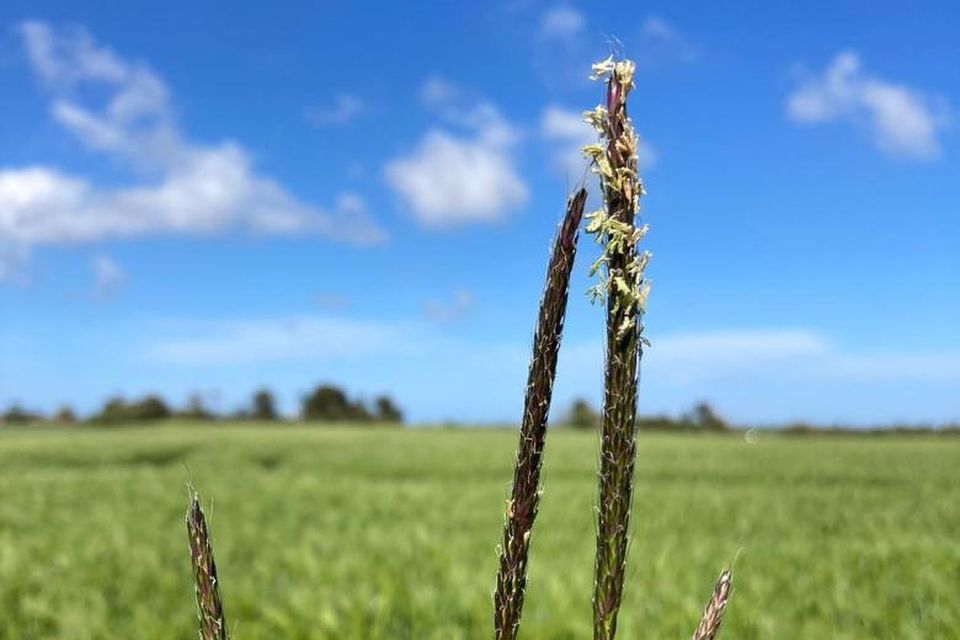Blackgrass and Italian ryegrass are spreading rapidly. They quickly develop resistance to herbicides, so farmers need to be ruthless and vigilant

Date: April 25, 2024
Shay Phelan
Journal: Irish Independant
The belatedly improved weather has prompted a mad dash to get spring crop drilled and to catch up on fertilising and spraying of winter crops.
While the mood of farmers has lifted somewhat there is still a foreboding that harvest 2024 is going to be relatively poor for most, even allowing for the €100 /ha payment recently announced.
We updated the Teagasc costs and Returns figures recently to reflect the likely scenarios for spring crops this harvest and they clearly show that there is no room for error or excessive spending if they are to leave a margin. Contact your local Teagasc advisor for the up-to-date figures.
One area where extra spending may well be justified is where difficult grass weeds need to be controlled. Recently I was in a field of winter wheat which had, like most crops in 2024, received a spring herbicide application (Pacifica Plus in this case), but there was some Italian ryegrass clearly unaffected by the herbicide.
This reminded me of farms I visited in Denmark last year, where this problem was common. So now it looks like I have two choices: either go back in with Axial Pro and hope that works, or let it seed out and get a herbicide resistance test. I will probably do both.
Over the last few years, as part of the recently completed Enable Conservation Tillage (ECT) project, we have been carrying out free herbicide resistance testing on both grass and broadleaf weeds, and the results have been sobering.
My colleague Vijaya Bhaskar recently reported that 92pc of all Italian ryegrass samples submitted to the lab were resistant to multiple ALS and ACCase herbicides; so basically products such as Pacifica Plus, Broadway Star, Falcon, Stratos Ultra were ineffective.
76pc of all blackgrass samples and 63pc of wild oat samples also showed resistance, and we have picked up some level of resistance in annual meadow grass.
This is even more concerning given that we now have confirmed the presence of blackgrass in practically every tillage county in Ireland and Italian ryegrass is spreading fast.
Last year a concerned merchant brought me to several fields where blackgrass had taken over in the fields of wheat. Unfortunately, notall had taken the responsible decision to destroy the crops before the blackgrass had set seed; least 50pc of the fields were harvested and baled and the straw sold.
I have no doubt that this scenario was replicated up and down the country last year and this problem will raise its head over the coming weeks in 2024 crops, or worse still in fallow areas where there is no competition.
One of the key lessons learned from countries like Denmark and the UK is that this laissez faire approach to dealing with Italian ryegrass or blackgrass, whether through arrogance or ignorance, will put tillage farmers out of business long before any dairy farm or solar company come knocking on the door.
What is clear from the samples tested, and from affected farmers in the UK and Denmark, is that repeated applications of the same herbicide year after year will breed resistance; in the case of Italian ryegrass this can happen after 3-4 years of using the same chemistry.
Worse still is using reduced rates of the herbicide either solo or as is happening commercially, mixing with another product from the same family such as ALS herbicides.
These practices will eventually result in those affected fields being forced back into grass, from where they may never return.
However, before you get too despondent there are steps that growers and agronomists can adopt to stop this happening, and there are cases where growers have solved a grass weed problem by being ruthless and vigilant. Cultural control methods like crop rotation, changing cultivation techniques, stale seed beds, hand rogueing, alternating chemistry and crop destruction if necessary can stop the progression of grass weeds.
Rob Coleman, one of the ECT focus farmers, said in a video on the Teagasc Tillage YouTube channel recently that “chemicals should be the last 5-10pc” of the grass weed control measures.
Teagasc’s herbicide resistance testing can be accessed by at bit.ly/3MrlcgR or by contacting your local advisor.
Many of the farmers who availed of the service said knowing the resistance profile of the grass weed has allowed them to put in place a management strategy to deal with the problem.